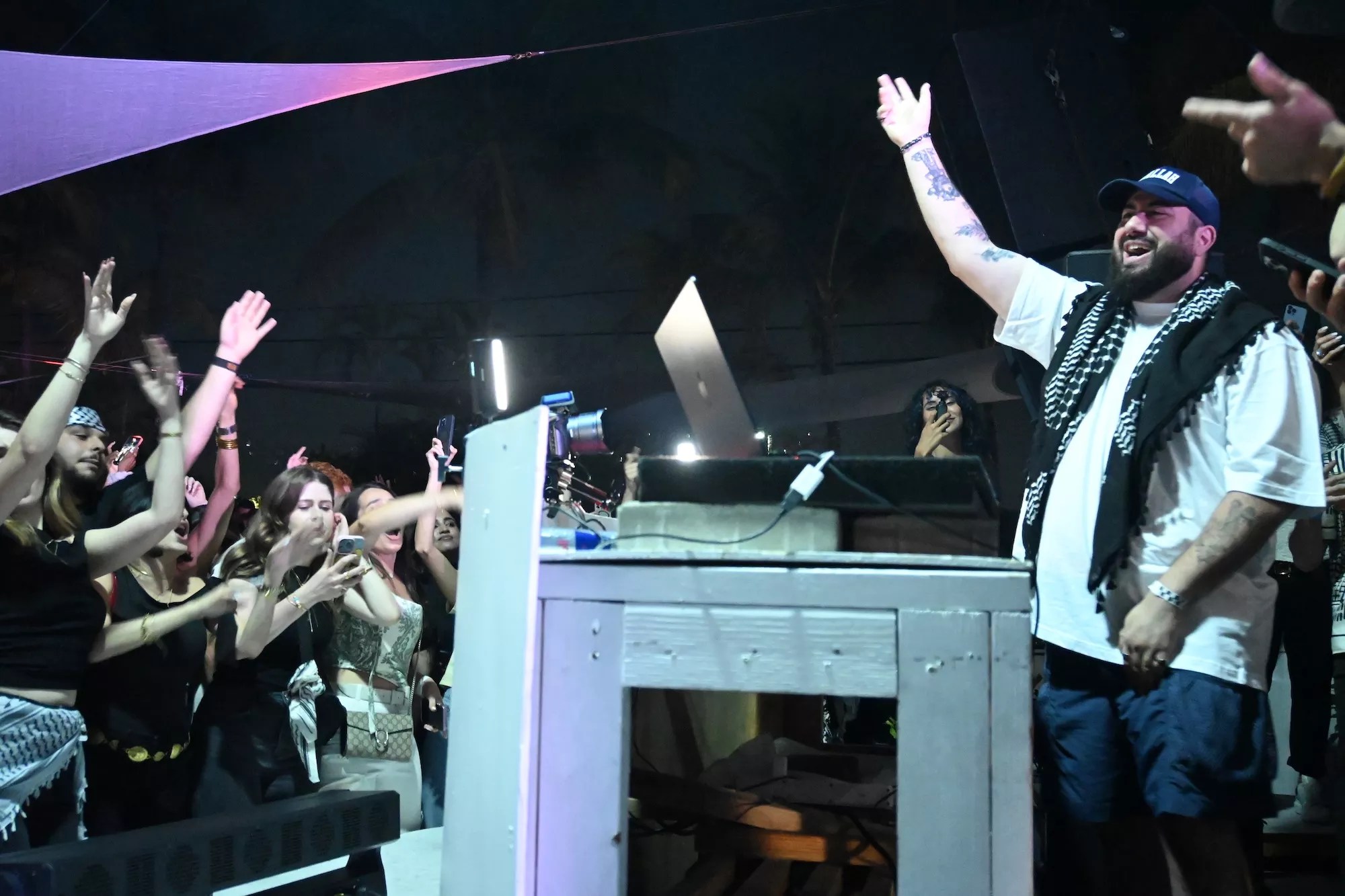
Listen–Up photo

Audio By Carbonatix
No Arabian Nights theme was used to sell tickets here. Just over a thousand people-many of them part of Miami’s Arab and Middle Eastern diaspora, but just as many from outside it-gathered beneath glowing string lights and tropical palms at ZeyZey on a warm Friday night to witness DJ Habibeats live.
Known offstage as Ibrahim Abu-Ali, the TikToker turned touring DJ rose to prominence with viral videos breaking down hip-hop samples and remixing Arabic classics. With over 1.6 million followers across social platforms, he’s since carved out a unique lane, blending the nostalgia of his Arab upbringing with the dance floor energy of house, trap, and global club music. Despite touring major cities across the U.S., his appearance at ZeyZey marked his Miami debut. The party sold out more than a week in advance, with over 1,000 tickets gone before doors even opened.
Abu-Ali grew up in the San Francisco Bay Area, raised by Palestinian parents who spoke to him exclusively in Arabic. It was his first language, and though he later shifted to English in school, the cultural influence never left.
“I feel very aligned with my purpose,” he says about honoring his heritage through music. “This is the truest version of myself.” He didn’t grow up DJing Arabic music at clubs; instead, he was spinning open-format hip-hop sets and learning to mix from his uncle, who introduced him to freestyle, Detroit house, reggaeton, and global sounds.
Last Friday night, he opened his set with a Miami staple, Pitbull’s “Hotel Room Service,” then wove in an Arabic bassline transition that flipped the familiar track on its head. It was a fitting metaphor for what he does best: remixing the known into something new. That broad palette shaped his current style, where iconic ’90s Arabic hits are reworked into house, jungle, or bass-heavy edits with universal appeal.
His latest track, “Hayati,” dropped the day of his Miami show. The crowd erupted when they heard its opening notes. A collaboration with Egyptian vocalist Felukah, the song marries Arabic lyrics with a bouncy, electro-freestyle beat. Hayati means “my life” in Arabic, often used as a term of endearment like “my love.” The lyrics – delivered with swagger and bite – are about self-respect and demanding honesty from anyone hoping to win your heart. “If you want to be my hayati,” DJ Habibeats explains of the message of the song, “you better come correct.”
Just as Afrobeats, reggaeton, and Punjabi tracks have crossed over into the mainstream, he believes Arabic music deserves the same space. “That’s exactly how I interact with Bad Bunny or really any music from any other culture that I don’t speak the language or understand as much,” he says. “That’s how I resonate with it. It’s just good music. And it has a certain flavor to it, right? No matter if it’s reggaeton or Punjabi music or Brazilian music, it just has its own flavor.” His goal isn’t just to represent but to normalize hearing Arab sounds everywhere, not just in niche clubs or cultural showcases.

Miami’s Pan-Arab community came out for DJ Habibeats’ set at ZeyZey.
Photo by Cassandra Martinez
Abu-Ali’s next goal is to one day perform an entire set solely of his own music. For now, his shows blend his original songs, edits, and nostalgic cuts. But with each release, he gets closer to building a catalog that fully reflects his voice. “Each song I come out with, I feel closer and closer to painting an accurate picture of what I want to put into the world,” he said.
By the end of the night, fans were waving flags from Palestine, Lebanon, Egypt, Jordan, Iraq, and beyond. Every drop hit like a memory for people who longed to hear their cultural identity in music they could finally dance to in the club. From the moment he stepped onstage to the final bass-heavy remix, the crowd was locked in – sweaty, screaming, smiling. The energy ran so high that the police shut it down 30 minutes early – but not before DJ Habibeats turned ZeyZey into a night people will be talking about long after the bass stopped and the lights turned on.